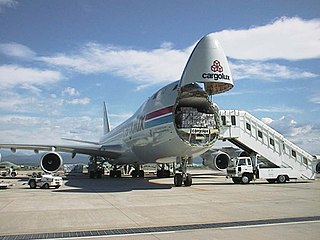 W
WAir cargo is any property carried or to be carried in an aircraft. Air cargo comprises air freight, air express and airmail.
 W
WIn the airline industry, a baggage handler is a person who loads and unloads baggage, and other cargo for transport via aircraft. With most airlines, the formal job title is "fleet service agent/clerk", though the position is commonly known amongst airline employees as a "ramp agent", due to the job's location on the airport ramp (tarmac).
 W
WA baggage handling system (BHS) is a type of conveyor system installed in airports that transports checked luggage from ticket counters to areas where the bags can be loaded onto airplanes. A BHS also transports checked baggage coming from airplanes to baggage claims or to an area where the bag can be loaded onto another airplane.
 W
WCargo airlines are airlines mainly dedicated to the transport of cargo by air. Some cargo airlines are divisions or subsidiaries of larger passenger airlines. In 2018, Airline Cargo Traffic represented 262,333 millions tonne-kilometres with a 49.3% load factor: 52.1% for dedicated Cargo Operations, and 47.9% within Mixed Operations.
 W
WThe Joint Precision Airdrop System (JPADS) is an American military airdrop system which uses the Global Positioning System (GPS), steerable parachutes, and an onboard computer to steer loads to a designated point of impact (PI) on a drop zone (DZ). The JPADS family of systems consists of several precision airdrop systems, ranging from extra light to heavy payloads. JPADS is used in conjunction with mission planning software that resides on a laptop. The function of this mission planning software includes computing release points, weather forecasting, acquiring measurements of wind velocity, altitude, air pressure, and temperature. It can also receive weather updates and en route mission changes through satellite links.
 W
WA unit load device (ULD) is a pallet or container used to load luggage, freight, and mail on wide-body aircraft and specific narrow-body aircraft. It allows a large quantity of cargo to be bundled into a single unit. Since this leads to fewer units to load, it saves ground crews time and effort and helps prevent delayed flights. Each ULD has its own packing list so that its contents can be tracked.
 W
WA Zeppelin is a type of rigid airship named after the German inventor Count Ferdinand von Zeppelin who pioneered rigid airship development at the beginning of the 20th century. Zeppelin's notions were first formulated in 1874 and developed in detail in 1893. They were patented in Germany in 1895 and in the United States in 1899. After the outstanding success of the Zeppelin design, the word zeppelin came to be commonly used to refer to all rigid airships. Zeppelins were first flown commercially in 1910 by Deutsche Luftschiffahrts-AG (DELAG), the world's first airline in revenue service. By mid-1914, DELAG had carried over 10,000 fare-paying passengers on over 1,500 flights. During World War I, the German military made extensive use of Zeppelins as bombers and as scouts, killing over 500 people in bombing raids in Britain.